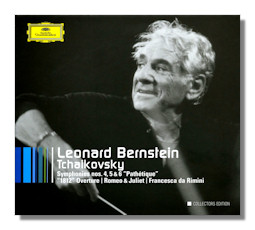
The Internet's Premier Classical Music Source
Related Links
- Tchaikovsky Reviews
- Latest Reviews
- More Reviews
-
By Composer
-
Collections
DVD & Blu-ray
Books
Concert Reviews
Articles/Interviews
Software
Audio
Search Amazon
Recommended Links
Site News
 CD Review
CD Review
Piotr Ilyitch Tchaikovsky

Collector's Edition
- Symphony #4 in F minor, Op. 36 (1878) *
- Symphony #5 in E minor, Op. 64 (1888) *
- Symphony #6 in B minor "Pathétique", Op. 74 (1893) *
- Symphonic Fantasy "Francesca Da Rimini" in E minor, Op. 32 (1876)
- Capriccio Italien in A Major, Op. 45 (1880)
- Fantasy Overture in B minor "Roméo & Juliet" (1869) *
- Marche Slav in B Flat Major, Op. 31 (1876)
- Overture solennelle "1812" in E Flat Major, Op. 49 (1880)
- Hamlet Fantasy Overture, Op. 67
* New York Philharmonic Orchestra/Leonard Bernstein
Israel Philharmonic Orchestra/Leonard Bernstein
Deutsche Grammophon 4776704 4CDs
Here we have Bernstein's "complete" Tchaikovsky recordings for DG (an Israel Philharmonic Romeo is out there somewhere) in generally fine sound and wholly gripping interpretations. Forget the notes and the need to tie Bernstein's homosexuality into the music-making. I think the conductor himself would have scoffed at the idea that he came to back to the composer's music on those grounds. Yes, Bernstein was a gay man living a double life (he deeply cared for his wife as well), but that has little to do – in my mind – with the simple fact that these are some of the most individual and intense Tchaikovsky performances ever recorded.
Bernstein's Columbia/CBS/Sony Classical readings of these works are largely regarded as classics. He recorded the complete symphonies (Symphony #4 twice) in New York for Columbia, and all the major tone poems as well. The late symphonies and tone poems are the easiest to find of this early lot. Of these later readings, the gruelingly visceral Pathétique is generally seen as the prize recording in this batch. It remains a thrilling and emotionally draining musical experience for a lifetime. These late tone poems are also pretty good, if not matching the earlier versions' youthfulness and alacrity.
In the Symphony #4, the conductor's third and final version (all in New York), Bernstein brings an almost crushing weight to the work. Gone are the swift tempos and whirlwind theatrics of the earlier versions. This is melancholy and power combined into an absolutely gut-wrenching reading that digs as deeply as it can. Perhaps it doesn't flow as naturally as it should, and it certainly misses a good deal of the manic energy that more famous renditions have, but it excites in its own way, and can be seen as a tonic for those who are sick of Tchaikovsky as pure bombast. It is rather heart-on-sleeve, especially in slower sections. Still, it's very personal. I liked it very much.
Unfortunately, what was compelling in the Symphony #4 is less so in the Symphony #5. Bernstein indulges in lots of tempo shifts in the main that distract from the music. I have found this symphony the least cogent of the canonical six, to say nothing of Manfred and the contested Seventh. It's a hard piece to hold together, and the various idiosyncrasies on display do absolutely nothing to help it, despite some fantastic playing from the New York Philharmonic. Phrasing is off, even labored from the start, and things don't really improve going forward. The finale is all over the place, although I love how Bernstein gets such a rich sound from his low strings at the start. As a testament of how far the New York Philharmonic was willing to follow their former leader, this is amazing. As a Tchaikovsky recording, it's not nearly as fine.
So much has been written about this particular Symphony #6 that I will say nothing save for what I've already written above. The tone poems have few of the odd gear shifts that the symphonies do, and they are largely excellent. Volume 2 of the "Leonard Bernstein Collection" will doubtless appear soon from Deutsche Grammophon and contain all the composers M-Z that Bernstein recorded. But if you – like me – don't intend to go all in, this is an important part of Lenny's legacy, and you should certainly sample it. The various "live" recordings continue to be perfectly acceptable, and at the very reasonable price, I encourage you to indulge in some deeply moving music making.
Copyright © 2014, Brian Wigman



















